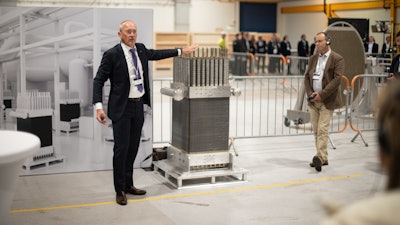
Norwegian fuel cell manufacturer Nel ASA today announced cash incentives and grants totaling some $75 million from the U.S. Department of Energy (DOE) and Michigan for the company's electrolyzer production facility in the state.
According to Michigan Governor Gretchen Whitmer, the plant will create 500 jobs in Plymouth.
Nel will manufacture its next-generation electrolyzer technologies, PEM stacks and pressurized alkaline stacks, which are used in hydrogen production. The PEM stacks are currently being developed in partnership with GM. Once fully operational, the facility should have an annual production capacity of 4 GW.
Most Read on IEN:
- CEO Faces Up to 30 Years in Prison for Selling Fake Medical Implants
- Boeing Promises Change
- Podcast: EV Maker's Money Problems; Toyota Gives Away Hydrogen Cars; Bridge Collapse Root Cause
- GM, Major Carmakers Are Telling Insurers How You Drive
The DOE granted Nel $50 million in direct investment support for the planned U.S. gigafactory, and the state awarded another $25 million.
The money will be used to enhance domestic electrolyzer manufacturing production capacity while building a clean hydrogen value chain and an industrialized manufacturing training program. Part of the investment includes partnerships with General Motors, Macomb Community College and Wayne State University's College of Engineering.
According to Nel President and CEO Håkon Volldal, the investment will help the company commercialize its products. The company hasn't made a final investment decision for the facility, which will depend on the market demand for the technology.
Nel recently partnered with Southern Company, one of the largest utility companies in the U.S., and GM on an integrated hydrogen microgrid pilot project at a power plant in Georgia.
According to Governor Whitmer, the funds came from the state's Make it in Michigan Competitiveness Fund, a pool of state money used to kick in enabling funds to match grants to unlock federally backed investments.
Nel has previously received about $50 million from the state to support the facility.






















